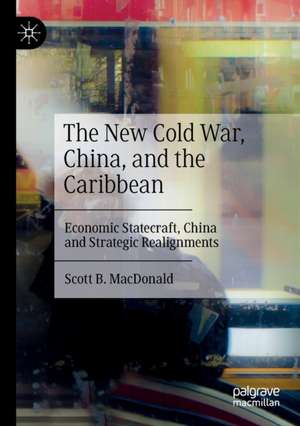The New Cold War, China, and the Caribbean: Economic Statecraft, China and Strategic Realignments
Autor Scott B. MacDonalden Limba Engleză Paperback – 17 iul 2023
| Toate formatele și edițiile | Preț | Express |
|---|---|---|
| Paperback (1) | 471.21 lei 6-8 săpt. | |
| Springer International Publishing – 17 iul 2023 | 471.21 lei 6-8 săpt. | |
| Hardback (1) | 567.49 lei 3-5 săpt. | +23.32 lei 4-10 zile |
| Springer International Publishing – 16 iul 2022 | 567.49 lei 3-5 săpt. | +23.32 lei 4-10 zile |
Preț: 471.21 lei
Preț vechi: 554.37 lei
-15% Nou
Puncte Express: 707
Preț estimativ în valută:
90.17€ • 94.38$ • 75.05£
90.17€ • 94.38$ • 75.05£
Carte tipărită la comandă
Livrare economică 31 martie-14 aprilie
Preluare comenzi: 021 569.72.76
Specificații
ISBN-13: 9783031061516
ISBN-10: 3031061519
Pagini: 302
Ilustrații: XVII, 302 p. 1 illus.
Dimensiuni: 148 x 210 x 23 mm
Greutate: 0.42 kg
Ediția:1st ed. 2022
Editura: Springer International Publishing
Colecția Palgrave Macmillan
Locul publicării:Cham, Switzerland
ISBN-10: 3031061519
Pagini: 302
Ilustrații: XVII, 302 p. 1 illus.
Dimensiuni: 148 x 210 x 23 mm
Greutate: 0.42 kg
Ediția:1st ed. 2022
Editura: Springer International Publishing
Colecția Palgrave Macmillan
Locul publicării:Cham, Switzerland
Cuprins
Chapter 1: Introduction.- Chapter 2: China’s Caribbean Adventure.- Chapter 3: China, Venezuela and Cuba - The New Cold War.- Chapter 4: China and the English-Speaking Caribbean and Suriname.- Chapter. 5: Caribbean Views of the new Geopolitical Landscape.- Chapter 6: The Long China-Taiwan Duel: Caribbean Echoes.- Chapter 7: Realignments, Tensions and Asymmetry: Russia and Iran.- Chapter 8: Europe and Canada – the Caribbean Relations and the New Cold War.- Chapter 9: U.S. Policy in a Choppy Caribbean Sea.- Chapter 10: Conclusion: Policy Options in Geopolitically Tumultuous 2020s
Notă biografică
Scott B. MacDonald is the Chief Economist for Smith's Research & Gradings, a Global Americans Research Fellow, and a founding member and Fellow of the Caribbean Policy Consortium.
Textul de pe ultima copertă
This book examines the slide into a new Cold War in the Caribbean. The primary argument is that the Caribbean’s geopolitics have shifted from a period of relative great power disinterest in the aftermath of the Cold War to a gradual movement into a new Cold War in which a global rivalry between the U.S. and China is acted out regionally. The result of this is a gradual polarization of countries in the Caribbean as they are increasingly pressured to choose between Washington and Beijing (this being very evident during the Trump years). It can be argued that the U.S. focus on the Caribbean in the late 1990s through the early 21st century diminished, leaving the region open to a China ready and eager to do business and guided by a diverse set of objectives. The book brings the reader into a discussion on international relations with a main focus on U.S.-Chinese relations being played out in the Caribbean, an important strategic region for the North American country.
Scott B. MacDonald is the Chief Economist for Smith's Research & Gradings, a Global Americans Research Fellow, and a founding member and Fellow of the Caribbean Policy Consortium.
Caracteristici
Examines the slide into a new Cold War in the Caribbean Brings the reader into a discussion on international relations with a main focus on US–Chinese relations Argues that the US focus on the Caribbean in the late 1990s through the early twenty-first century diminished
